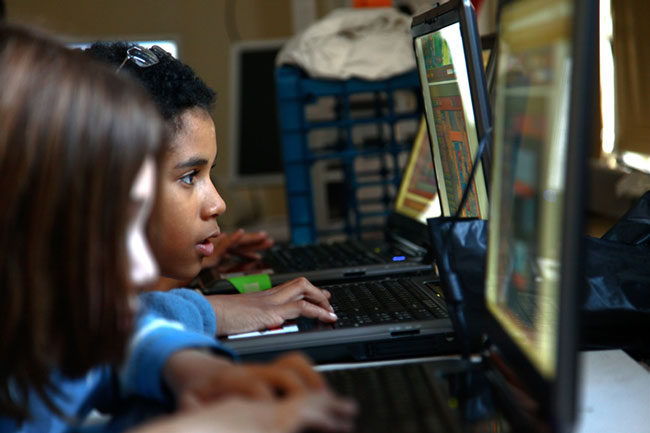For Young Brains, Teaching Technologies Are Hit-or-Miss

Many parents plop down their babies in front of Mozart, TV and educational video games every day in hopes of raising a smart, well-adjusted human being (or just giving mom and dad a break). That mass exposure of young brains to technology , some researchers say, is one of the greatest natural experiments ever conducted outside of labs — and yet the end results remain complex or unknown.
As many as one in three American babies has been exposed to baby DVDs marketed to parents as learning tools, according to some estimates. But the enthusiasm for technology that can boost learning at all ages often outpaces the actual scientific proof for what works, according to a new review study.
All technologies are not created equal, and their effects don't translate as simply as an "educational" label meaning good and an "entertainment" label meaning bad. In fact, some products marketed as educational have proven either useless or even counterproductive to learning.
Asking how all technology affects children's brain development is about as useful as asking how food in general affects their physical development, said Daphne Bavelier, a neuroscientist at the University of Rochester, New York, and her colleagues. Their review of past studies on TV and video games found that the specifics for each technology's impact make all the difference. [Related: World of Warcraft Video Game Succeeds in School]
"This is a delicate balancing act," Bavelier said, "and parents definitely need to watch closely their children’s usage of technology. … There is no one-size-fits-all answer."
Different technologies don't necessarily leave lasting impressions on the brain, studies have shown. The so-called "Mozart Effect" — the popular belief that having babies listen to Mozart’s music stimulates their brain development — turned out to have less to do with classical tunes and more to do with any stimulating experience that temporarily boosts arousal and mood.
Rather than study such short-lived effects, Bavelier and her colleagues decided to focus on research regarding the long-term impact on children's brains.
Get the world’s most fascinating discoveries delivered straight to your inbox.
When to switch on the TV
Parents eager to give their young infants a head start may want to reconsider just how much they rely on technological aids. In the studies that were reviewed, baby DVDs proved a waste of money at best, and some products such as "Baby Einstein" or "Brainy Baby" actually seemed to slow down language development.
Babies learn much from interacting with their parents or other people with all senses engaged, and so they might represent too young an audience for TV-based learning, Bavelier told LiveScience in an e-mail.
"It is not clear that babies are equipped to learn from audio-visual worlds; the research suggests they need social interactions and direct feedback," she said. "Touch is very important."
Still, studies found that educational TV shows such as "Dora the Explorer," "Blue's Clues" and "Clifford the Big Red Dog" gave boosts to the vocabulary and language skills of children between the ages of 9 months and 30 months. TV also showed promise for children through the rest of their preschool years (up to age 5).
But some shows produced mixed or negative results. The TV show "Teletubbies" actually had a negative effect on vocabulary and language.
Shows that successfully promote early literacy often focus on child-directed speech, getting a response from viewers, object-labeling and a storybook structure, according to past research. The research suggests that such shows also can fight antisocial behavior — a factor linked to poor school performance — by teaching young kids how to resolve social conflicts.
Not just child's play
More recently, video games have drawn much interest as possible learning tools.
In adults, some games appeared to improve learning and brain flexibility overall, so that the skills learned within a game carry over to the real world. "It is as if these games re-created in the adult a brain state we typically see in young, more malleable brains," Bavelier told LiveScience.
Still, not all games have proven as capable for helping students, and some areas of education have proven harder to crack than others.
Many examples of reading software had no boosting effect on literacy for first- and fourth- graders, according to a massive study by the U.S. Department of Education. Similarly, the game FastForWord had no effect on language or reading skills for U.S. students within grades 3-6.
Using games to boost math skills proved more promising. An action-packed video game called Dimension M managed to beat traditional lessons in teaching linear algebra to seventh- and eighth-graders at an underachieving U.S. school district, according to a study this year.
Commercial games meant for entertainment also may benefit players in positive ways. Supposedly mindless action games in which players step into the boots of soldiers to shoot one another (or aliens) have shown the ability to boost attention skills and snap-decision-making.
Bavelier herself has conducted past studies on how such action shooter games also can train the brain to process visual information more efficiently, and pick out shades of contrast.
Learning what's next
Serious games can learn a lot from the games aimed solely at keeping kids and adults alike glued to their computers or video game consoles, researchers say. But the researchers do caution that certain game content, such as violence, should not be ignored.
Games, TV or other technological aids won't eliminate the need for focused parents, teachers and schools with an educational game plan. Similarly, students should not expect games to eliminate the need for physical activity, social interactions, academic activities and after-school activities, Bavelier pointed out.
"I know kids love our work, but all we show is that action video game play can have beneficial effects on behavior when practiced in moderation," Bavelier said.
Experimental models of education, such as School of One or New York City's Quest to Learn school, have already begun using games to promote a highly exploratory and interactive learning experience. Meanwhile, researchers want to refine their studies to better pick out just what makes successful games and other technological tools work.
"Our method to the madness is to start from first principles of learning theory and, in particular, reinforcement learning," Bavelier said. "We are really interested in understanding the components in game play that foster brain plasticity and learning."
The review study is detailed in the Sept. 9 issue of the journal Neuron.
- Video Gamers Hooked for Life
- 10 Things You Didn't Know About the Brain
- 10 Technologies That Will Transform Your Life



